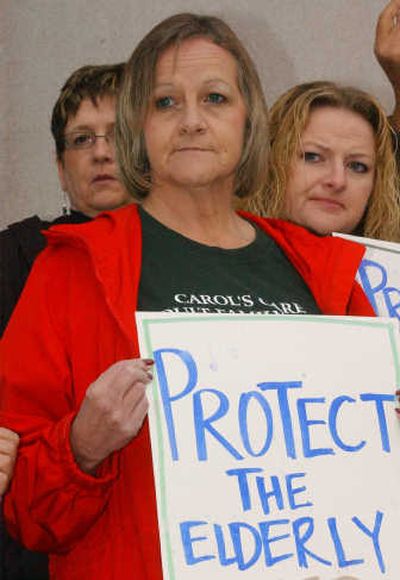Caregivers seek help from state

OLYMPIA – Saying that a new state rule threatens to drive them out of business and their clients into the streets, owners of adult family homes across the state came to Olympia on Tuesday to plead for help at the capitol.
“I think there’s an absolute crisis in this industry right now,” said Greg Devereux, president of the largest state-worker union, the Washington Federation of State Employees. It’s one of two unions vying to represent the homes.
The state Department of Social and Health Services wants the homes to get liability insurance, saying it’s prudent for a business and helps shield the state from lawsuits. But the $2,300 to $7,500 annual cost is too much for marginal businesses to bear, many of the owners told a representative from the governor’s office Tuesday.
“We have a choice of paying the heat bill or getting liability insurance,” said LeAnn Riley, who owns two of the homes in Spokane.
There are about 2,250 adult family homes affected by the new rule, according to DSHS. About 950 have bought the insurance.
DSHS, which regulates the homes, tried to ease the financial burden by delaying the requirement until insurance rates went down, said spokeswoman Kathy Spears. But having the coverage is a requirement.
The other 1,300 are worried they will lose their state contracts unless they have the insurance by Dec. 1. They’re asking that the Dec. 1 deadline be lifted and that the state pick up the $5.4 million annual tab to insure them all.
“Folks are concerned that they’re going to lose their licenses or that people will be put out on the street or moved somewhere else” with lesser care, said Tim Welch, a spokesman for the union.
“I’ve lived in a nursing home. I’m not going back to a nursing home,” vowed Dawn Brasier, a 36-year-old disabled woman who lives in a SeaTac home. She credits the home with helping her cut her weight – by half – to her current 144 pounds.
“I wouldn’t be where I am today without her,” Brasier said, indicating the woman who runs the home that cares for her. “She’s my family.”
The federation this year helped win collective bargaining rights for the homes, which the state pays to care for elderly and disabled people. But it’s now locked in a struggle with a professional group, the Washington State Residential Care Council, for the right to represent the care providers. In a September vote, the residential care council outpolled the federation 594-214.
Aaron Mountain, a Yakima-area adult family home provider who’s president of the residential care council, said he’s skeptical that the insurance requirement is as big a threat as some owners say. He dismissed Tuesday’s demonstration as “grandstanding” by the federation.
“The real problem is the rates and it’s always been the rates,” he said. “The state pay rate is ridiculous.”
Mountain said his group is instead focusing its efforts at improving pay by $11 million in additional state payments next year, which would be doubled by a federal match.
“We are here for the long haul,” he said.
On Tuesday, Brasier and about 40 of the owners and workers of homes hand-delivered a stack of letters to the governor’s office, pleading for her to lift the requirement. Many said they are barely breaking even now, and if their patients go to nursing homes or state institutions, it will cost far more.
Riley said insuring her two adult family homes would cost $5,000 to $10,000 a year.
“I can’t afford it,” she said.
“My business has been in the negative for four years,” said Carol Carroll, another owner of a Spokane adult family home. She said she hasn’t paid herself in seven years, and that she’s had to take out a second mortgage on her home to keep things going.
“How much hardship do we need?” she said.
Carroll said she paid $2,400 to get the coverage. But some adult family home owners, she said, are planning to move to Oregon, where the state payments are better.
Jonathan Seib, the governor’s executive policy adviser on long-term care, met with the group and assured them that their requests “will get meaningful consideration.”
He said he couldn’t promise them they’d get what they want, but that the issue is clearly on the governor’s radar.
The governor will next month propose a small “supplemental” budget to the two-year budget passed this spring; it remains to be seen whether the adult family homes’ insurance payments will be part of that.
“All I can tell you at this point is that you’ve been heard,” Seib told the group.